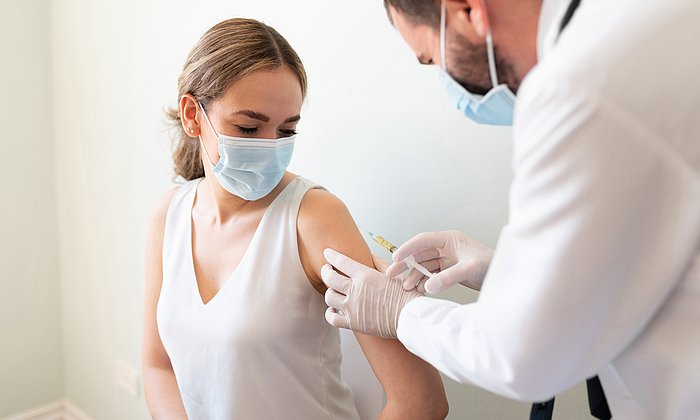Europe-wide study on sociodemographic factors in vaccination willingness
Which older people refuse to be vaccinated?

Who are the people who do not want to be vaccinated against Covid-19 or are undecided about the vaccine, even though they are in the high-risk age group? In order to find out more about their demographic, socio-economic and health characteristics, a research team at the TUM Chair of Economics of Aging and the Max Planck Institute for Social Law and Social Policy analyzed data from the Survey of Health, Ageing and Retirement in Europe (SHARE), regarded as the largest pan-European social science panel study. The second SHARE Corona survey, conducted from June until early August, collected data on 47,000 individuals in the high-risk 50+ age group across 27 European countries and Israel.
Major differences between countries
Around 18 % of the respondents reported that they have not been vaccinated. However, there was great variation across countries: Malta, Denmark and Spain were in the lead with over 95% of respondents vaccinated and Romania and Bulgaria trailing behind with about 28% and 21 % respectively. Germany was in the upper middle range, with a vaccination rate of 89 percent of respondents over 50 years of age.
Of the unvaccinated respondents from all countries, 33 % reported that they were still undecided, while 45% stated that they didn’t want to get vaccinated. This figure was 54 percent for Romania and 45 percent in Bulgaria. A similar share of the unvaccinated still did not want to be vaccinated in Latvia (46 percent) and Lithuania (43 percent). In Germany the share of vaccination refusers and unvaccinated individuals was also high at 50 percent. However, because of the significantly smaller number of unvaccinated, this figure is subject to a relatively high degree of uncertainty.
Men decide more often to be vaccinated
In a next step, the researchers considered the demographic, socio-economic and health situation of those respondents who were undecided or refused the vaccine. Here it turned out that the respondent's economic situation had a visible impact. People within the lowest quartile of the income distribution more frequently did not want to be vaccinated or were undecided than those in the higher income quartiles. This finding was supported by the respondents’ subjective reports of how hard it is for them to “make ends meet”: Nearly 30 % of people who stated that they could make ends meet only with great difficulties were undecided or refused vaccination, while it was only 7.8 % for those reporting to be able to make ends meet easily. This clear pattern was evident in almost all countries.
While the share of people who were undecided or refused vaccination was about 14.7 % among those with primary education, it was 16.1 % in the group with secondary education, but only around 9.2 % among individuals with post-secondary education. There was also a connection between employment status and vaccination willingness. The difference was greatest between unemployed respondents, of whom 28.5% were undecided or opposed to getting vaccinated, and retired respondents, of whom 11.5 % had opted out of or were still undecided about the vaccine. One explanation may be the age effect, which also played a role: Respondents between 50 and 65 years were more likely to refuse the vaccine than older respondents and this applied to nearly all countries.
Gender also had an impact. On average, 14.5 % of the women were undecided or refusing the vaccination, compared with 12.8 % among men. This difference was evident in most, but not all countries: In Hungary, Portugal and Switzerland for example, there were more males who were still undecided or didn’t want to get vaccinated.
People knowing Covid-19 patients are more likely to get vaccinated
Regarding health, respondents without a diagnosed physical illness had a higher probability of being undecided or unwilling to be vaccinated (16.9 %) compared to those with at least one diagnosed illness (12.4 %). This difference was strongest in Hungary, Lithuania, Luxembourg and Switzerland.
Further, the researchers found a difference between those people who stated that they didn’t know anyone physically affected by Covid-19 and those who did. Of those who did not know anyone affected, 14.7 % reported being undecided or unwilling to get vaccinated. The number was 13.7 % for people that knew somebody mildly affected and 10.3 % for those that knew somebody severely affected by Covid-19.
Bergmann, Michael; Hannemann, Tessa-Virginia; Bethmann, Arne; Schumacher, Alexander: "Determinants of SARS-CoV-2 vaccinations in the 50+ population". MEA Discussion Paper 07-2021.
(The publication is a working paper, which has not yet been subject to the peer review process.)
SHARE, the Survey of Health, Ageing and Retirement in Europe, is a research infrastructure for studying the effects of health, social, economic and environmental policies taking the entire life-course of European citizens into account. From 2004 until today, 480,000 interviews with approximately 140,000 people aged 50 or older from 28 European countries and Israel have been conducted. The SHARE Corona survey is a special survey with a sub-sample of the SHARE panel. SHARE is coordinated at the Max Planck Institute for Social Law and Social Policy by Prof. Axel Börsch-Supan, holder of the TUM Chair of Economics of Aging.
Contacts to this article:
Dr. Michael Bergmann
Technical University of Munich (TUM)
Chair of Economics of Aging
Tel.: +49 89 38602 322
michael-bergmann@tum.de







